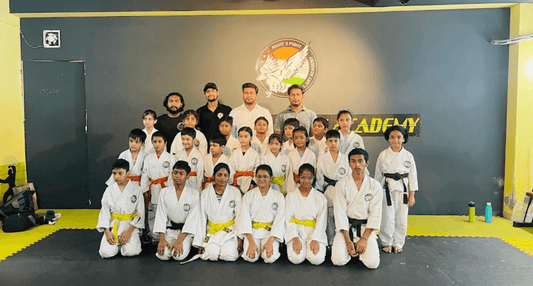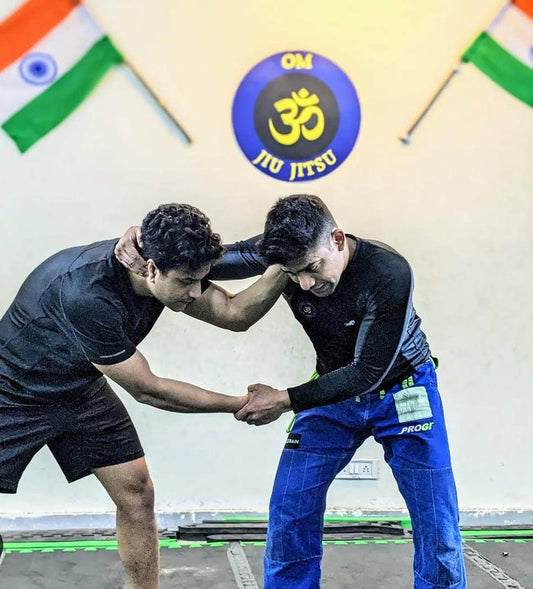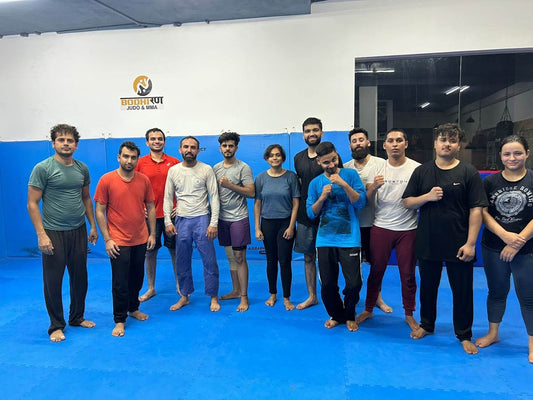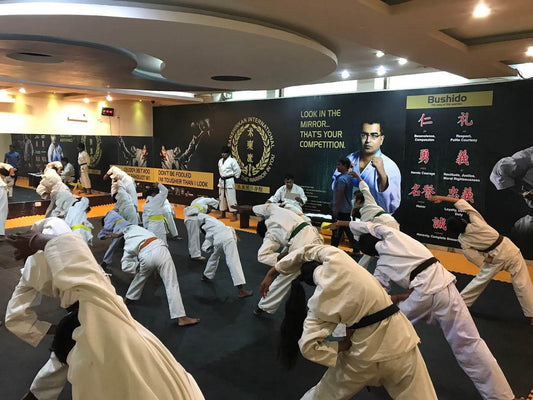-
R2F Martial Arts Academy | Badshahpur Sector 66 Gurgaon
Regular price From ₹1,500Sale price From ₹1,500 Regular priceUnit price per -
Om BJJ & MMA Academy for Martial Arts | Huda Colony Sector 46 Gurgaon
Regular price From ₹2,500Sale price From ₹2,500 Regular priceUnit price per -
Bodhi Raan Judo & Mixed Martial Arts (MMA) Academy | Sector 38 Gurgaon
Regular price ₹3,000Sale price ₹3,000 Regular priceUnit price per -
Sanshinkan Martial Arts Academy | Sector 56 Gurgaon
Regular price From ₹12,000Sale price From ₹12,000 Regular priceUnit price per
About Jujitsu Academies in Gurugram
Jujutsu Classes and Dojo: A Path to Self-Defense, Discipline, and Mental Clarity
Jujutsu (or Jujitsu) is a traditional Japanese martial art that focuses on the use of technique over strength, making it accessible to individuals of all ages and fitness levels. With a rich history that dates back to the samurai, jujutsu has evolved into a versatile form of self-defense, a dynamic fitness regimen, and a method for developing mental fortitude and discipline.
What is Jujutsu?
Jujutsu is a martial art that involves using an opponent’s energy and movements against them. This makes it highly effective for self-defense, particularly when faced with a stronger or larger opponent. The core techniques of jujutsu include joint locks, throws, strikes, and pins, designed to neutralize or subdue an opponent quickly and efficiently. Jujutsu practitioners use leverage, balance, timing, and the element of surprise, rather than brute force, to overcome adversaries.
While jujutsu initially developed as a method for warriors to defend themselves without weapons, it is now practiced for various reasons: self-defense, fitness, competition, and personal growth. It teaches a deep understanding of body mechanics, spatial awareness, and emotional control.
Why Choose Jujutsu Classes?
-
Self-Defense Skills: One of the primary benefits of jujutsu is its emphasis on practical self-defense techniques. Students learn how to protect themselves in real-world situations, equipping them with the tools to react quickly and decisively when confronted with danger. Jujutsu techniques are particularly effective because they don’t rely on physical strength; instead, they focus on technique, positioning, and exploiting an opponent's weaknesses.
-
Physical Fitness: Jujutsu classes are an excellent way to improve overall physical fitness. Through rigorous training, students build strength, flexibility, endurance, and agility. The practice involves both cardiovascular and strength-based exercises, which contribute to improved stamina, muscle tone, and overall health. Additionally, jujutsu training offers a full-body workout, engaging core muscles, legs, and upper body through throws, grapples, and strikes.
-
Mental Clarity and Focus: Training in jujutsu fosters mental toughness. The discipline required for mastering the techniques sharpens focus, enhances problem-solving skills, and encourages perseverance. As students progress, they learn how to stay calm under pressure, manage stress, and approach challenges with a clear mind. This mental discipline is not only useful in martial arts but also in everyday life.
-
Boosts Confidence and Self-Esteem: As students develop new skills and see progress in their training, their self-confidence naturally increases. Jujutsu classes often create a sense of achievement and empowerment, especially when practitioners learn to defend themselves effectively. Mastering self-defense techniques can make individuals feel more secure and capable, enhancing their self-esteem both on and off the mat.
-
Community and Support: Jujutsu dojo (training halls) foster a supportive community where students train alongside like-minded individuals. The camaraderie that develops in these environments is an essential part of the learning process. Practitioners support one another, whether through sparring, learning new techniques, or discussing martial arts philosophy. This positive social interaction can lead to lifelong friendships and a strong sense of belonging.
What to Expect in Jujutsu Classes
At a typical jujutsu dojo, classes are structured to cater to both beginners and advanced practitioners. Here’s what you can expect during a typical session:
-
Warm-up and Conditioning: Classes often begin with a dynamic warm-up to prepare the body for the physical activity ahead. This includes stretching, strength exercises, and mobility drills. Warm-ups help prevent injuries while improving flexibility and agility, which are critical in jujutsu.
-
Technique Practice: Jujutsu training revolves around learning and perfecting various techniques. Instructors will guide students through foundational movements like joint locks, escapes, throws, and submissions. The instructor will provide feedback, ensuring students are using proper form and leverage.
-
Sparring and Randori: Once the basics are mastered, students engage in controlled sparring or randori (free sparring), where they put their skills into practice against a resisting opponent. Sparring allows students to experience the flow of real combat situations and helps develop reflexes, timing, and adaptability.
-
Mindfulness and Philosophy: A significant aspect of jujutsu is its underlying philosophy, which emphasizes respect, humility, and discipline. Many dojos incorporate moments of mindfulness or meditation, where students can reflect on their training, breathe, and center their focus. This helps deepen the mind-body connection, a crucial component of mastering the art.
-
Progression and Belt System: Like many traditional martial arts, jujutsu has a belt ranking system, which allows students to track their progress and level of expertise. Progression is based on both technical ability and personal growth. As students gain more experience, they earn higher belts, signifying their advancement and dedication to the practice.
Choosing the Right Dojo
When selecting a jujutsu dojo, it’s important to consider a few key factors to ensure it aligns with your goals:
-
Qualified Instructors: Look for dojos with instructors who have experience and proper certification in jujutsu. An instructor’s knowledge, teaching style, and ability to communicate effectively with students can greatly influence the quality of your training.
-
Training Environment: A dojo should have a welcoming, clean, and safe environment where students can train without fear of injury. The dojo should also maintain a culture of respect and discipline, where all students are treated equally regardless of skill level.
-
Class Structure: A well-organized class structure that progresses from fundamental skills to more advanced techniques ensures that students build a strong foundation before advancing. Look for dojos that offer consistent classes, as regular practice is key to success.
-
Community and Atmosphere: The sense of community within the dojo plays an important role in your training experience. A supportive and respectful atmosphere helps students feel comfortable and encourages long-term growth.
Conclusion
Jujutsu classes are not just about learning to defend yourself; they are about developing discipline, focus, and mental strength. With a combination of physical training and philosophical principles, jujutsu helps practitioners grow both mentally and physically. Whether you're looking to get in shape, improve your self-defense skills, or become part of a supportive community, jujutsu offers valuable benefits that extend beyond the dojo. Choose a reputable dojo, commit to your training, and embark on a journey of self-improvement, fitness, and personal empowerment through jujutsu.



























